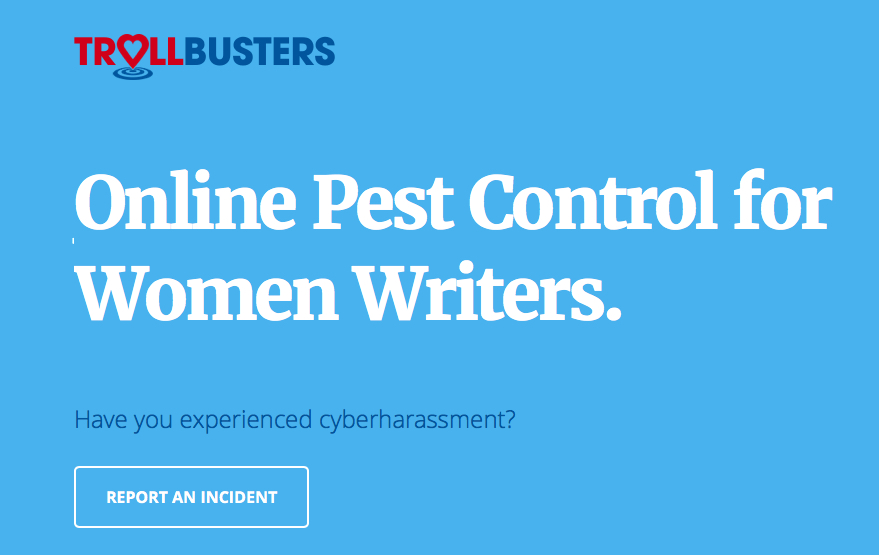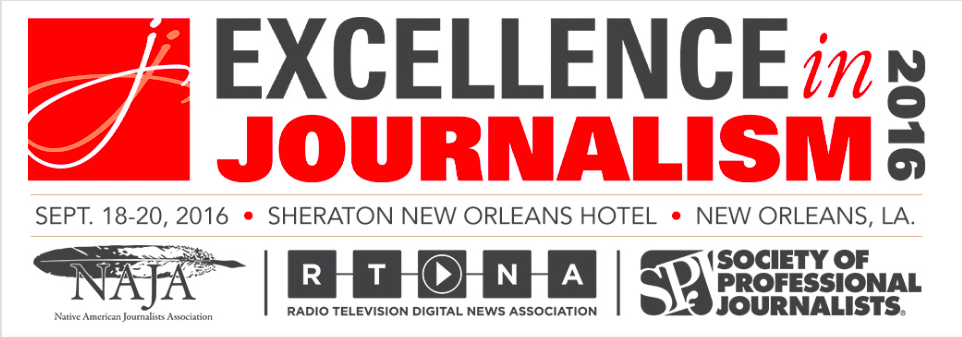Vol. 1, No. 4 October 2016
Inside this issue:
- From the President’s Desk
- Who You Gonna Call? TrollBusters!
- EIJ Conference Spotlights Investigative Journalism
- RTDNA Honors Charlie Rose with its Top Award
- Pro Chapter Roundtable Discussions
- What the Board and Delegates Did at EIJ16
- Censorship Through PIO Examined at Convention
- Crash Course for Journalists on the Intricacies of Media Law
- Calendar for Upcoming Events
Image credit (below): Adobe Stock
Dear Colleagues,
The October 2016 issue of our DC Chapter Newsletter focuses on the many activities at our National Convention (Sept. 18-20) held in New Orleans, with the Society of Professional Journalists, partnering with the Radio Television Digital News Association (RTDNA) and the Native American Journalists Association (NAJA.) More than 1,000 professional and student journalists crowded into the conference center to sample a diverse collection of seminars, iconic keynote speakers, special awards to some of the “best journalists in the business,” along with the annual Business Meeting and elections. Our Chapter was represented by Delegates and Board members Alice Ollstein (director), Kathryn Foxhall (recording secretary) and Kathleen Burns (Chapter president.) We were joined by fellow Delegate and Region 2 Director Andy Schotz. A highpoint of the event was that on the eve of the convention opening, National SPJ President Paul Fletcher, on behalf of the association, had his Letter to the Editor published in the NY Times of Sept. 17, questioning the foot dragging by the Obama White House in responding to issues raised in December 2015 in a meeting of 40 journalists and open-government groups with White House Press spokesman Josh Earnest. (See link: “Less Than Transparent: Journalists Fault Obama.”)
It was a rousing call to arms to journalists to actively speak up about the obstacles those in media face in covering “the news,” especially in this controversial election year.
Looking ahead to 2017, SPJ will move its convention to San Diego and the Alameda Marriott in Alameda, CA., from Sept. 7 to 9. Talks are underway to consider future partnerships for the event with the National Association of Hispanic Journalists, along with RTDNA and SPJ. For 2018, the Conference moves to the East Coast, with the event slated for Sept. 27 to 29 in Baltimore.
Take a look at the extensive coverage from the SPJ-RTDNA Convention and feel free to submit any comments or suggestions to burnskathy1036@gmail.com. Our Chapter Board welcomes your ideas.
Our Board meets on Oct. 25 at 7 p.m. at the National Press Club and we’ll be discussing potential changes for the format of our DATELINE Awards contest and suggestions for our Program Events for 2017. Submit other ideas for the upcoming Agenda.
Sincerely,
Kathy Burns, president
DC SPJ Chapter
Image credit (above): Screenshot from TrollBusters website
Who You Gonna Call? TrollBusters!
Alice Ollstein
“Just ignore it.”
“Don’t go on Twitter.”
“It’s only online. It’s not real life.”
This is how many people respond when journalists speak out about being the victims of vicious online harassment. But, as journalists in 2016, who must stay fully plugged into social media and connected to our readers, this advice is dismissive and unhelpful. And because some journalists have had online harassment escalate into stalking, doxxing (the posting of personal information like a home address or medical records), identity theft, and death threats, ignoring the abuse can be dangerous.
A poll by the International Women’s Media Foundation found that nearly two-thirds of women journalists have experienced such intimidation, threats or abuse in relation to their work, including threats to their family or friends.
Thankfully, the Trollbusters are here. The organization, founded by women of color who have directly experienced online abuse, has built tools to protect and support those attacked by trolls. Though they hope to expand in the future, they are currently limiting their work to serving only women journalists.
At a workshop at this year’s SPJ conference in New Orleans, TrollBusters founder Michelle Ferrier spoke about the online abuse she experienced as a columnist for the Daytona Beach News-Journal. The harassment, which involved rape and lynching threats, escalated so much that the FBI became involved, and the experience was so scarring that she left journalism altogether.
“Trolls are angry that women and people of color now have more of a voice in the media, and their goal is to intimidate and silence us,” she said.
But now, a woman journalist experiencing a torrent of online abuse can fill out a simple form on TrollBusters’ website–http://www.troll-busters.com/–to request a real-time rescue service. TrollBusters staffers then take a series of steps:
-
Send a warning to the trolls responsible for the harassment, to let them know they’re being watched. Sometimes this is all it takes to get the harassing behavior to end.
-
If the behavior continues, the group creates what they call a “hedge of protection” around the target: a series of positive messages to drown out the trolls and comfort the target. These messages can be anything from inspirational quotes to practical tips on online protection to funny memes.
-
Support the target in protecting their online identity and information, which can include everything from medical and voting records to personal photos and home addresses.
-
Monitor the target’s social media feeds for her so that she doesn’t have to read the abusive messages herself, and flag credible threats for reporting.
Ferrier said that while everyone from news editors, to social media corporations like Twitter, to law enforcement officers are not doing enough to discourage online harassment and support its victims, her service is there to help.
Martin Baron is executive editor of The Washington Post.
EIJ Conference “Spotlights” Investigative Journalism
Alice Ollstein
One of the many highlights of SPJ’s 2016 Excellence in Journalism conference in New Orleans was a Q and A with Marty Baron, the editor of The Washington Post and former editor of the Boston Globe. Hundreds of students and journalists packed into a massive conference hall on Sunday, September 18th to hear Baron talk to former journalist and academic Kirsten Lundberg about the Pulitzer-winning investigation of priest abuse Baron led at the Boston Globe, the current state of journalism, and why every reporter needs to think like an investigative reporter.
“When people say, ‘I guess we’ll never know what really happened,’ that should be like chum for reporters,” he said. “You don’t go into investigative reporting. You go into reporting and Investigate.”
Baron counseled the gathered SPJ members to not worry about upsetting a source when going after a major story, saying: “Our loyalty is not to our sources; our loyalty is to our readers.”
And while computer-assisted reporting (CAR) and data visualizations are all the rage–and the focus of many SPJ conference workshops–Baron encouraged reporters to keep using basic, low-tech reporting techniques. “Street reporting, talking face-to-face, and even just talking on the phone seem to be lost arts in journalism,” he said.
Baron also lamented that in a time of deep budget cuts in newsrooms across the country and a 24/7 news cycle, many outlets are abandoning the in-depth investigations they once pursued.
“I think it’s important that news organizations rededicate themselves to investigative reporting,” Baron said. “It’s what sets us apart from everybody else out there, and by the way, it’s absolutely core to our mission, as journalists: holding powerful institutions and powerful individuals accountable.”
The Oscar-winning film Spotlight, which portrays Baron leading a team of reporters uncovering the Catholic Church’s pattern of covering up sexual assault, is a testament to this philosophy.
Charlie Rose (left) and Jeff Marks were honored by RTDNA.
RTDNA Honors Charlie Rose with its Top Award
Kathleen Burns
A highlight of the joint SPJ-RTDNA Convention in New Orleans Sept. 18-20 was the presentation to CBS and PBS journalist Charlie Rose of the Paul White Award. It is RTDNA’s highest honor for contributions to the journalism profession and freedom of the press.
RTDNA established the Paul White Award in 1956 to honor the broadcast news pioneer who served as the first news director at CBS. The award recognizes an individual’s lifetime contribution to electronic journalism. Past recipients of the Paul White Award include: Chris Wallace, Linda Ellerbee, Steve Kroft, Christiane Amanpour, Charles Gibson, Tom Brokaw, Dan Rather, Peter Jennings, Bob Schieffer, Ted Koppel, Pauline Frederick and Edward R. Murrow.
Speaking to a packed ballroom, Rose thanked RTDNA for honoring him for his belief “in the power of curiosity. We define, we debate, we expose and, if we do that, we will be on the front lines of those who oppose us.”
Rose literally works day and night. He is a co-host of “CBS This Morning” with Norah O’Donnell and Gayle King. He is also a contributing correspondent to “60 Minutes,” whose recent interviews include Russian President Vladimir Putin, Apple CEO Tim Cook, Comedian Larry David, Broadway’s Lin-Manuel Miranda and Formula One driver Lewis Hamilton.
He also continues to serve as executive editor and host of “Charlie Rose,” which appears nightly on PBS and in prime time on Bloomberg Television in the United States and around the world. Since 1991, “Charlie Rose” has aired countless hours with Nobel Laureates, and extraordinary men and women of science, politics, art, business, sports, technology, literature and entertainment.
In addition to his Emmy and Peabody Awards, and the Legion d’honneur, Rose holds several honorary degrees, and numerous awards from the scientific and journalism communities including the Walter Cronkite Award for Excellence in Journalism. In 2014, he appeared on TIME’s list of the 100 Most Influential People in the world. He was born in Henderson, NC, and graduated from Duke University in Durham, NC, with a B.A. in History and a J.D. from the School of Law. He also attended the New York University Graduate School of Business.
Also honored by RTDNA was broadcast journalist Jeff Marks, currently director for talent development for Gray Television, the owner of television stations in 50 U. S. markets.
A man who usually works behind the scenes, Marks came into the national spotlight and in front of the cameras in August 2015. The then- president and general manager for Roanoke, VA, WDBJ TV was praised for courage, professionalism and leadership when he “guided the station through the shock, mourning and recovery…that followed the on-air killings of two Channel 7 employees.”
For his actions, Marks was awarded the John F. Hogan Distinguished Service Award that recognizes “an individual’s contributions to the journalism profession and to the freedom of the press.” (Hogan was the founder and first president of RTDNA. The award was established in 1959.) Past winners of the Hogan Award include: Walter Cronkite, Frank Stanton, David Sarnoff and Terry Anderson.
In addition to his eight years spent in broadcasting in Roanoke, Marks also held journalism positions in Maine, New Jersey, New York and Washington, DC. He began his broadcasting career in 1971 as a student at the University of Kentucky and in 2015 was named to the Kentucky Journalism Hall of Fame. He has coached numerous journalists at the Pointer Institute in St. Petersburg, FL, and lectured and trained journalists overseas in Romania, Georgia and Ukraine.
We salute both men for the outstanding achievements in the field of journalism!
Pro Chapter Roundtable Discussions
Kathleen Burns
One of the highlights of the Convention for Chapter Officers and Board members were the numerous networking opportunities. Particularly helpful were the round table discussions so officers could share ideas on the common problems they all faced and possible solution options. Topics included: Membership; Recruiting, Training and Retaining Board members; Organizing Programs; and how to develop your annual Media Awards Contests. I spoke with members from Chapters in: Seattle; Madison, WI; South Florida; Chicago; Arkansas; District of Columbia; Long Island, NY; East Tennessee; and New Jersey.
The South Florida chapter grew its membership by combining 3 geographic regions into one state-wide chapter, and then moving meetings around the state to these locations. They also added to Chapter membership by recruiting journalists in the Virgin Islands and Puerto Rico, who are connected via website and emails as well as the national QUILL magazine. The Chapter sponsors meetings every other month. The Chapter also teamed up with the National Association of Hispanic Journalists to recruit Spanish-speaking potential members.
With the annual Awards competition, they offer discounts for entries by Chapter members plus a discount for members and non-members who submit 2 or more entries—and they pulled in 1,000 entries!
The Seattle Chapter attracted 2,900 entries through tiers of fees, for members, non-members, retired members and Early Bird applications. They always extend the deadline by one week, and charge an extra $5 or $10 for that option. To win new entrants, they send an invitation to ALL the area’s media contest winners, noting “you won last year” in the contest so why not try again? They also contact ALL major media organizations in their geographic region to seek submissions.
The Chicago Chapter woos new members through their annual Awards Dinner. Any new member who joins their SPJ Chapter the night of the Awards can get a free one-year membership, thanks to an anonymous donor who covers that cost. Their contest pulled in 925 entries and they review the categories every year to see which were successful and which weren’t.
With the New Jersey Chapter, they focus primarily on statewide weeklies and online media for their contests and drew 500 entries for 2016. But there is concern that Gannett bought the Bergen Record and its 25 weeklies, and fired 200 people, so their numbers of entries for next year may drop. They give out the annual awards at a weekend brunch and have a good turnout, charging only $20 for a ticket. But next year, they think they’ll charge more for the meal and less for the contest submissions.
And it isn’t only large Chapters that can do well with these annual contests, according to Jean Ash of the East Tennessee Chapter. They have only 55 members but garnered 100 entries. The first submission is free for members versus $20 for non-members.
Representatives from the various Chapters said it is always difficult to recruit competent, committed and capable candidates for Board vacancies. Suggestions offered included:
- Avoid contested contests, since no one wants to lose. Don’t wait for “volunteers” but divide up the membership list among incumbents and actively recruit people for specific spots and pick a unified slate
- Instead of making this an annual “ordeal,” have a two-year term for officers. Change your Bylaws if you need to accommodate this change.
- Allow Board members to attend by Skype if they can’t make it in person.
- Aim for a diverse, multi-generational Board and select from equally diverse career areas (print, online & digital, broadcast and academic) for representation on the Board as well as categories for the media awards competition.
- Don’t ignore long-time Chapter members and try and recruit them for important Committees, such as those for Programs and for Communications (newsletter, website, social media, outreach and publicity for events.) This gives these appointees strong hands-on experience and makes them good candidates for future Chapter officers and leaders.
Tara Puckey, National SPJ membership strategist, also offered the group some hints for strengthening the many aspects for creating viable Chapters:
- Remember that people don’t join organizations. They join by invitations and personal relationships. “People join People,” she emphasized. This network can enhance growing membership numbers, community involvement and greater interests in the media awards, for the local chapters as well as the national Pro and Student competitions.
- Plan to have an annual Board Retreat, to build an enhance these internal relationships. (The DC Chapter has followed that advice for the last 3 years.)
- Use the DiSC Inventory provided by SPJ at this Retreat to help mesh individual skills with the group’s interaction and administrative needs.
- Make sure your Chapter’s website is an active, functioning tool, along with finding the best online company that meets the needs for your Chapter’s media awards program, based on your budget and prospective number of participants. Enhance the website beyond the basics, hiring outside people for help, if necessary, or tapping into pro bono assistance. Keep the information current on the website or it minimizes the value to Chapter members.
What the Board and Delegates Did at EIJ16
Andrew Schotz, Region 2 director
Below is a recap of discussions and actions taken by the SPJ national board and convention delegates during Excellence in Journalism 2016 in New Orleans in September.
*****
SPJ national board meeting #1 (Sept. 18):
1) From SPJ Executive Director Joe Skeel’s staff report:
• The Native American Journalists Association would like to join NAHJ, RTDNA and SPJ for EIJ17.
• SPJ’s social media followers were: 33,000 Facebook; 42,000 Twitter; 2,345 LinkedIn.
2) The national board revoked the charters of three inactive chapters. It also designated 22 chapters as “inactive,” including one in Region 2 — Howard University. “Inactive” is an intermediate step. A chapter can easily be revived if there is interest, but this is a sign that there has been no sign of interest in a while.
3) The board unanimously approved a motion by at-large director Bill McCloskey made a motion that SPJ consider reincorporating in another state. SPJ currently is incorporated in Illinois. Under Illinois law, SPJ and other nonprofit organization can’t take electronic votes. This makes it tricky for SPJ to do conference call and electronic meetings, and take any action.
4) The final action was a vote on a change in the awards process. Last year, the board voted to give the final approval on most SPJ national awards (minus the Wells Key). Region 3 Director Michael Koretzky decided this year that the board didn’t need to formally vote on these awards, but should have the right to call for a vote after reviewing the choices. At EIJ16, the board approved that update to the process. Two people voted against this change — me and Region 6 Director Joe Radske. [Note: I voted no because the new iteration of the process was not what the board decided last year — we wanted approval authority, not the ability to review.]
For more information about these and other topics, go to the board packet:
https://www.spj.org/pdf/boardmeeting/spj-board-meeting-agenda-2016-09-18.pdf
*****
SPJ national board meeting #2 (Sept. 18):
1) At-large director Bill McCloskey was again chosen to serve on the Executive Committee.
2) University at Maryland SPJ chapter member Maggie Gottlieb, who won a seat on the board as campus representative, also was added to the Executive Committee. Gottlieb and new campus representative Keem O. Muhammad were each nominated to serve on the Executive Committee, resulting in a secret vote within the board.
3) Bill McCloskey and I were chosen for the Finance Committee
4) The board talked about the process for choosing the Wells Key, resulting in a proposal to have the national board, and not just the Executive Committee, review nominations. After a period of debate on this and other points, the proposal was tabled. Three people voted against tabling the proposal — Koretzky, Radske and me.
*****
Conference business session (Sept. 20):
1) Delegates approved several resolutions as a group:
• Commending Mark Thomason for standing up to a Georgia judge who had him arrested and jailed because of a public records request he made
• Urging the University of Kentucky to comply with Kentucky’s public records law
• Urging President Barack Obama to abandon restrictions to getting government information
• Support increased protections for student journalists
• Support women in journalism
• Recognize Alistair Cooke’s contributions to British-American relations
• Thank outgoing SPJ President Paul Fletcher and the SPJ staff
2) A change in the bylaws to create a “supporter” category, in which people can donate money to SPJ without becoming full members, was approved by a voice vote.
First, there was some concern that the new category would steal people who might otherwise be members.
By a 69-31 vote, delegates supported preserving a provision that anyone in the “supporter” category would be ineligible for full membership.
3) Delegates approved a bylaws change that addresses a gap in representation of SPJ members who don’t belong to a chapter. The new process is to choose delegates in each region to represent unaffiliated members, at the same same rate (one delegate per 50 members) in place for chapter delegates.
The measure passed by a voice vote, with only D.C. Pro chapter President Kathy Burns opposed.
4) A resolution to start the process of renaming “Society of Professional Journalists” to “Society for Professional Journalism” was defeated 57-44.
[Note: After being opposed to this idea for a few years, I voted in favor this year. I think the proposed name now matches changes underway to make SPJ more open and inclusive.]
5) By a predominant voice vote, delegates tabled a resolution opposing requirements that college faculty give mandatory “trigger warnings.” The resolution did not oppose the warnings, which might precede possibly objectionable discussion topics in class; it challenged making those warnings mandatory. Ben Meyerson of the Chicago Headline Club, who moved to table the resolution, said it strays from SPJ’s journalism mission.
6) By a predominant voice vote, delegates approved a resolution supporting the rights of journalists to report on political campaigns without threats or reprisal. A first draft of the resolution was amended to remove references to specific presidential candidates, so it would apply to all presidential candidates and all journalists.
7) Delegates approved a resolution supporting transparency in media ownership.
An early draft of the resolution was aimed at Sheldon Adelson for his family’s secret purchase of the Las Vegas Review-Journal, condemning “the manipulation of news outlets for personal gain by wealthy media owners everywhere.”
The broader revised version that passed condemned “the clandestine behavior of Adelson’s group leading up to the purchase of the Las Vegas Review-Journal and subsequent manipulation of news coverage.”
The revised resolution passed by voice vote, with two people voting no.
*****
Election results:
1) President-elect: Rebecca Baker — unopposed
2) Secretary-treasurer: J. Alex Tarquinio — unopposed
3) Director at-large (one open seat):
• Rachel Wedding McClelland — (winner)
• Jason Parsley
• Elle Toss
• Alex Veeneman
4) Campus adviser at-large (one open seat):
• Leticia Lee Steffen — (winner)
• Chris Dublin
5) Regional directors
• Region 1: Jane Primerano (unopposed)
• Region 4: Patricia Gallagher Newberry (unopposed)
• Region 5: Michele Day (unopposed)
• Region 7: Kari Williams (unopposed)
• Region 8: Eddye Gallagher (unopposed)
• Region 9: Ed Otte (unopposed)
6) Student representative (two open seats)
• Keem O. Muhammad (of New York University)
• Maggie Gottlieb (of the University of Maryland)
• Emily Bloch
• Jessica Hice
• Katherine Rosenhammer
There were 1,016 votes, for a turnout of 16 percent.
Censorship Through PIO Examined at Convention
Kathryn Foxhall
The “Censorship Though PIO” issue, which the DC Pro Chapter has taken on as a signature effort, was front and center at SPJ’s national meeting in New Orleans in September.
A resolution, sponsored by DC Pro Chapter President Kathleen Burns and passed by consensus at the business session, noted that SPJ had led 53 groups in asking President Obama to change policies including, “prohibiting journalists from communicating with staff without going through public information offices; vetting and monitoring interviews; and using ‘on background’ briefings that block reporters from identifying the speakers for information that should be public.”
The resolution mentioned the meeting that SPJ led last December to talk to White House Secretary Josh Earnest about the issues and it urged President Obama to act so as to “not leave these extraordinarily serious restrictions in place as he leaves the Presidency.”
In addition to the resolution, at the SPJ Executive Board meeting outgoing President Paul Fletcher discussed how SPJ has pushed this issue at the national level. He said his favorite day of his presidential year was when he sat across from Earnest at the White House and argued with him about the restrictions.
In a more light-hearted convention moment, Fletcher regaled convention-goers at the legal defense fund auction with the story of how the society heard “crickets” in the months after the visit, despite Earnest’s promise to give an answer.
Then there was the stunning moment Aug. 30 when Earnest had a letter in The New York Times saying journalists should give President Obama more credit for his steps to be transparent.
Very quickly, SPJ had a letter signed by 40 groups to Earnest saying that journalists had pointed out the ways in which transparency had become worse. A letter also went to The New York Times.
And, just as Fletcher was doing the last minute things to leave for the SPJ meeting, he got a call from The New York Times saying they wanted to print the letter. It was in the print edition Sept. 17, just as some preliminary SPJ meeting activities were starting.
Fletcher told the crowd the whole story as a prelude to auctioning a copy of that New York Times with his signature near the letter. The copy sold for $500 to David Cuillier, a past SPJ president, who was also a delegate at the White House meeting.
The PIO and related obstructions were subject of more serious focus at the Freedom of Information Committee meeting. Dr. Carolyn Carlson of Kennesaw State University, who has led SPJ’s seven surveys on this problem, is planning a project to interview key journalists on it. DC Pro Chapter member Kathryn Foxhall said she felt it is time to fund a major analysis of the restrictions, in the spirit of a 1950s report that helped lead to the national freedom of information law.
The meeting was a heartening illustration of SPJ’s leadership. The society has pushed this from something no one would admit was a problem into a national discussion in a few years.
See also: OP-ED on PIOs by SPJ National President Paul Fletcher featured in The New York Times.
Crash Course for Journalists on the Intricacies of Media Law
Kathleen Burns
The DC Chapter of SPJ joined the National Press Club and the Media Law Resource Center Institute of New York in co-sponsoring a day-long legal workshop on Sept. 20 at the NPC. The program was aimed at freelancers, bloggers, independent journalists, and reporters and editors working without the benefit on a legal advisory department. An enthusiastic audience of 75 showed up for the sessions, according to George Freeman, executive director of the Media Law Resources Center in New York. And the instructors for the sessions were some of the top legal minds who handle media law in courts, classrooms and corporate offices throughout the United States.
One session included the timely topic in this year’s election races of “Publication of Truthful Embarrassing Private Facts” and issues of privacy. Under the heading of Libel Laws, there were topics dealing with elements of tort law; constitutional precedents, based on the benchmark case of the New York Times v Sullivan; defining public versus private figures; and relying on anonymous sources.
Attorney Katie Townsend, of the Reporters Committee for Freedom of the Press, tackled aspects of the Freedom of Information Act (FOIA) while attorneys Jay Ward Brown and Mara Gassmann, of Levine Sullivan Koch & Schulz, discussed of Newsgathering Torts, such as Intrusion, Hidden Cameras and Wiretapping, Trespass, Lying and Breaking Contracts.
Attorneys Chuck Tobin and Adrianna Rodriguez, of Holland & Knight, explored the nuances of the” Relationship with Sources and the Reporters’ Privilege,” while attorney Alison B. Schary, of Davis Wright Termaine, delved into “Copyright and Digital Media,” along with components of the danger of tweeting, plagiarism and aggregation. Legal experts Robert Lystad, of AXIS PRO, and Kevin Goldberg, of Fletcher, Heald & Hildreth, offered tips to journalists in the audience for a “Primer on Media Insurance and Legal Help.”
At the Editorial Roundtable, speakers included: Donna Leinwand Leger, managing editor for breaking news, USA Today; Rachel Smolkin, digital executive political editor, CNN; Autria Godfrey, anchor, WJLA-TV, in Washington, DC; Mike Semel, local editor, The Washington Post; and Ashley Messenger (panel moderator), senior associate general counsel, NPR.
For those who missed the Washington sessions, the Media Law Resource Center will take its show on the road for 2017, with similar programs slated for Los Angeles, San Francisco, Chicago and Miami. Check the organization’s website at: www.medialaw.org or phone them at 212-337-0200 for details.
Prior to joining the Media Law Center, Freeman spent more than 30 years at The New York Times as its First Amendment expert and as the company’s Assistant General Counsel. The Center’s membership includes 125 major media companies as well as 200 law firms that represent media clients. Freeman is also the William J. Brennan Professor at Columbia University Journalism School and also teaches law at New York University and the City University of New York Graduate School of Journalism.
CALENDAR for UPCOMING EVENTS
December Chapter’s Annual Holiday Party—-venue and details pending.
Newsletter editor: Elizabeth Grisham
Copy deadline for the next Chapter email update: Nov. 18








